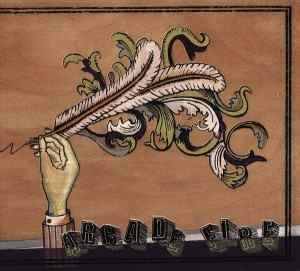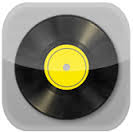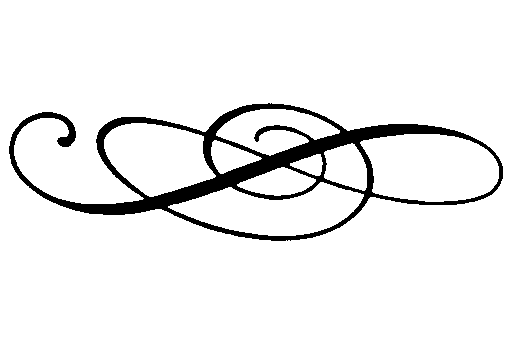

 Arcade Fire
Arcade Fire
| Release date | Label | Producer | Genre | Length | More info |
| 2004.09.14 | Merge / Rough Trade | Arcade Fire | Art Rock | 48:02 |  
 |
A post-post-rock portrait of our neighborhood - weird, scary, confusing, but oddly optimistic.
Background
Almost by its very definition, "indie rock" is not supposed to be envisioned on a grand scale. Lo-fi production, dirty basements, cryptic lyrics, shocking behavior, torn T-shirts, trying your audience's patience, strong feelings in the place of "uncool" professionalism - these are all typical trademarks, but above all, indie people are sort of supposed to be loners who don't give much of a damn about whether the audience likes them or not, let alone actively involving huge crowds of people in their music rituals. I mean, even when Kurt Cobain "sold out the underground", so to speak, with Nevermind, this was in the form of an accident rather than anything consciously planned; and by the early 2000s, "indie" rock had once again stabilized to the degree that huge international success for an indie band became an impossibility almost by definition. It could be good music, it could even be genius music, but it was always targeted at a small, specific niche audience, unable to or unwilling to find itself a more common and accessible language (see, for instance, the entire Elephant 6 scene as a typical case). Almost to the extent, that is, that it could be wondered if a major breakout beyond the trench lines of Pitchfork and the like was at all possible. A non-specially-marketed, anti-corporate indie outfit that would speak out to more or less everybody? In 2004, probably more of a starry-eyed dream than anything close to reality (I remember myself asking the question around the time and usually getting sarcastic answers like "and remind me why we should actually want something like this, again?").
At the same time, though, with myself completely unaware of what was going on, the stars were one more time (one last time?) assuming a nice configuration. These guys came from Canada, an alleged bulwark of progress. They appeared shortly after 9/11 and the Iraq war, at a time when many people began regaining their senses and realizing that the "end of history" was still nowhere in sight, and that the world was actually a far more dangerous and far less intelligent place than they'd sort of assumed it had already become. They were influenced not only by the previous generation of indie bands, but also by the post-rock scene, including "orchestral bands" like their compatriots Godspeed You! Black Emperor, and by arena-rockers like U2 and Bruce Springsteen (not exactly icons of coolness for the indie scene). They consciously took the pop route, choosing simplicity over complexity and accessibility over total enigma, but they could use all those influences to make their pop sound look fresh, innovative, and inspiring - whatever their real motives were, it always seemed like the real reason why they targeted the masses rather than the select few was idealism, rather than a banal search for fame and fortune. They took a big, daring, gambling leap - and somehow, managed to hit the jackpot: as of now, Funeral remains the most highly rated album of the 21st century on the RateYourMusic site, and I really wonder how long it will take for somebody to chase them out of that superplace. Want it or not, the 2000s are still regarded as "The Arcade Fire Decade", and we will try to see why that is (or, at least, why I personally agree with this).
Some basic factsPeople have often commented upon how the album was seriously influenced by some recent deaths in the band's extended family, namely, Richard Reed Parry's aunt, the Butler brothers' grandfather, and Chassagne's grandmother, although only the last of these deaths is explicitly mentioned in the last track, and despite the title, the thematic scope of the record is much wider than just brooding on the ultimate fate of man - otherwise, it could never have hoped to achieve truly classic status. Ironically, since the band was quite unknown at the time and did not get enough publicity, Funeral scored very low on the charts: in the US, it stalled at #123, whereas all of its follow-ups immediately shot to #2 or #1. But the critical reputation of the record has endured - even after Arcade Fire became almost a household name with the success of Suburbs six years later, the average critical/fan opinion still holds that the band never really managed to top that first big shot. Every time a new Arcade Fire album comes out, there's a huge hullabaloo accompanying it, but the dust settles pretty soon, and through the smokescreen we once again see Funeral emerge victorious, its reputation undimmed. Why? Read on to find out.
For the
defense
There can probably be no better "defense" for Funeral than properly remembering and accurately laying down the history of my own reaction to it. I first heard the album five years after it'd already come out, at the end of 2009 (without ever having heard about it before, actually - yes, some people can really be out of touch with the times, and proud of it!), liked what I heard, wasn't particularly impressed because it sounded too simplistic and overblown at the same time, took a few more listens, ended up hooked, wrote a positive original review... then I found myself returning to the album over and over again, then I found myself hooked on watching various recordings of Arcade Fire's live shows (which they generously allow to be kept on YouTube forever), and as I am relistening to it one more time, I come to a clear understanding that no other album from this century that I've heard comes even remotely close to the power, passion, and depth of Funeral. Simply put, the album breaks completely out of the mold by... well, by hitting precisely that same nerve that I kept instinctively wishing for somebody to come along and finally hit. Not that it did anybody much good, but at least it makes me feel alive every time I relisten to it, and hey, that's already got to count for something.
Did the band "invent" a new type of sound with these songs? Yes and no, I guess. No, because the idea of mixing rock and (neo-)classical instrumentation was not new (and, in fact, was clearly taught to them by their friends from GY!BE), and because the loud, bombastic, "sermonizing" style of art-pop had been established by bands like U2 a quarter century prior to this. But also yes, because this particular synthesis is fresh - it is essential that there is a big batch of musicians, none of them virtuosos but each of them carrying out his or her limited task to perfection, and by combining these multiple waves of perfectly honed individual simplicity, they are able to transform U2-like tight spiritual drive into something on a truly universalist scale. Although Funeral deals with issues that are often intimate and personal (you could easily envisage most of these tunes played on acoustic guitar by some somber basement-locked singer-songwriter), by confiding them to this huge, but loyal and understanding community of players, Butler and Chassagne enhance the power and influence of each of these statements ten-fold. And you are hearing this from somebody who, by definition, is biased against anthems or sermons of all sorts, yet even I wouldn't mind joining in the choir to ʻWake Upʼ, were I ever to hear it live.
But the technical aspects of Arcade Fire's sound do not really impress me on their own - only as a necessary tool for achieving that incredible emotional resonance. Few albums in musical history, and almost certainly no other album in the past 15 years (though I'm still not losing hope) can walk that thin line between desperation and optimism as effectively as Arcade Fire do on Funeral. This is an album about death - and about resurrection; about disillusionment - and about hope; about confusion - and about consolation, usually both extremes not just within the same song, but within the same bars and lyrical lines of the same song. It is incredibly well-balanced and intelligent, never leaning too dangerously to the "whiny" side, nor becoming bogged down in politically correct clichés. It is beautifully sequenced, starting out with some of the most personal songs, then gradually winding its way up towards massive sermons, and ultimately winding down on a deeply personal note yet again. And it introduces us to a couple of unforgettable personages - Win and Régine - who breathe new life into the conception of "that goddamn indie rocker who can't hold a note worth a damn".
Win is, of course, the supreme ruler of the record, yet I would still like to concentrate first on Ms. Chassagne, who is the band's vital sprite and without whose presence Arcade Fire would be so much less fun. She is, in fact, the band's most original and unique presence - successfully impersonating (or really being?) a little kid trapped in a grown woman's body, a kid so overflowing with feelings that she just has to play a little bit of each instrument without ever becoming a professional musician, has to sing without ever building up vocal muscle, and has to have these cute little songs like ʻHaitiʼ that sound like fun, harmless dance numbers on the surface, but actually betray a lot of pain within: it is sung (and performed) from the perspective of the unborn children spirits of the island, and the song's chorus, with its amicable falsetto whoo-ooh-woo-ooh-woo-woo-woos, is in reality a rather spooky dance of a bunch of will-o'-the-wisps that draws its merriment from a foundation of horror, while Régine herself plays some sort of Stephen King character. And this is reflected in the music: not only is the merry pop melody itself born out of chaotic noise (to which it periodically returns over the song's course), but even the tonality itself is suggestive of a very special, ritualistic, and maybe even doom-laden type of merriment. Basically, you're not invited to forget all the troubles of the world when you're obliviously dancing or at least tapping your toes to the rhythms of ʻHaitiʼ: on the contrary, this is a funeral dance, sometimes bordering on Zombie War Dance, presided over by a dreary female presence who is usually seen prancing over the lawn with ribbons in her hair, but will also stop at nothing if she deems it necessary to put a pair of steel needles in your rotten dictatorial homicidal eyeballs.
Compared to this, Win Butler's personality actually comes across as less complex, because, unlike Régine, he never sounds even superficially happy; but his emploi is that of a deeply unhappy lyrical hero who never stops searching for happiness, on a personal or a global level, and, again, this is always reflected in the instrumental side of things. Take note how many of these songs begin slow and then accelerate towards the end, almost like a pre-set formula: ʻTunnelsʼ, ʻUne Année Sans Lumiereʼ, ʻCrown Of Loveʼ, ʻWake Upʼ... and the "final dance" always emerges as a demon-chasing ritual to clear away the gloom and, if not to welcome happiness, then at least to attract it, one way or another. The doom and gloom may be of a totally personal nature, as the lyrical hero mourns his family (ʻTunnelsʼ) or a fading relationship (ʻCrown Of Loveʼ), or of a general nature (ʻWake Upʼ is essentially a pamphlet against the increasing debilitation of the young people), but the codas always sound credible and uplifting in their energy; it's like an "oh, okay, life sucks, let's dance on it!" conclusion that seems utterly stupid and delightfully hopeful at the same time, but is in any case preferable to just endless streams of moaning and groaning, far more typical of the indie singer-songwriter approach.
ʻRebellion (Lies)ʼ, which was the fourth single from the album (and the most commercially successful at least in the UK), is probably the greatest of them all because it does not alternate between spooky and optimistic, it gives you both at the exact same time. The accompanying video pictured the band banging the drum and marching through Sleepytown, waking up its frozen inhabitants upon passing and leading them away like a 21st century Pied Piper troup - the song, in comparison, remains ambiguous to the very end, as its throbbing bassline symbolizes dread, battle, and freedom at the same time, so you never know if they have real hope in the revolution or if they are just inciting people to arms out of sheer necessity, never really believing in eventual success. In any case, the lyrics are great (this is the second song after ʻWake Upʼ that uses sleep as a negative metaphor, but does not throw out any particular, personality- or epoch-based accusations, so it could be taken up as a call to arms by just about anybody anywhere), and on no other song do they show themselves as such expert masters of the steady, simple, totally efficient build-up: each individual instrumental part seems fairly simple, but once the dum-dum-dum bass, the tink-tink-tink piano, and, eventually, the droning electric guitars and roller-skating violins all merge into one big multi-colored wave, I have no idea who could ever resist this pull. Perhaps a band like The Cure could easily outdo these layers in terms of further compositional and engineering complexity, but Robert Smith's only goal with this would be to drown you in the resulting ocean of depression, whereas these guys are inviting you to walk on the water instead, singing along to "every time you close your eyes - lies, lies!" as if your eventual survival could actually depend on how long and how loud you do this. Most likely, we'll all drown anyway, but at least we won't give up without a fight. Or perhaps we might even win the fight - it is this possible ambiguity of interpretation that makes Funeral really shine in all its psychological depth.
Some of the tunes are more enigmatic than others, and some of the conceptual decisions suggest ideas you wouldn't be thinking of otherwise: for instance, the four ʻNeighborhoodʼ tracks naturally suggest that they should all go together as parts of a single suite, but what is there in common between ʻTunnelsʼ and ʻLaikaʼ, or between ʻPower Outʼ and ʻ7 Kettlesʼ? Lyrically, yes, most of them have references to "neighbors" and "neighborhoods", but is this really some sort of allegorical saga of the lyrical hero's relations with his surroundings, or are we interpreting things too literally (or too seriously for their own sakes)? I do get the impression that it's all about the proverbial battle between the old and the new, the traditional and the progressive, the "communal" and the "personal" - ʻLaikaʼ, in particular, seems to be delivered from the actual point of view of the "neighbors", always ready to brand an outcast ("Alexander, our older brother") and symbolically illustrated by the comically "bourgeois-sounding" accordeon melody ("now the neighbors can dance!"), but this is just one possible interpretation; the only sure thing that can be said is that it features the band at their craziest, and you, too, are invited to go crazy for a bit along with them (on stage, they used to have "battles" between Parry and Will Butler to enhance the feeling of general madness and hostility, although I have no idea who of the two was supposed to be "Alexander" and who was supposed to be the neighbor). In any case, all these songs are open to intellectual and emotional interpretation, but all of them go for the gut straight away.
Win's lack of strong singing voice has sometimes been mentioned as one of the band's major flaws, but I consider it a blessing - for instance, it is precisely the contrast between the big booming power of the opening one-chord riff, the immense stormwave instrumental build-up, and the choral harmony waves of ʻWake Upʼ, on one hand, and the weak, barely holding on lead vocal of Butler, on the other, that gives the song its unique appeal: a weak, but determined loner holding on to a piece of driftwood on that ocean, a solitary voice speaking out of the maelstrom, a contrast between the brave realism of the individual and the energy field that can be generated once these individuals unite in the process of "holding your mistake up, before they turn the summer into dust". Actually, that's precisely what the line "we're just a million little gods" is about, even if the first part of the message is pessimistic, because the "little gods" are "turning every good thing to rust"; again, a combination of dread and depression with desperate optimism all the way, right down to the contrast of the boastful "with my lightning bolts a-glowing, I can see where I am going!" and the panicky "you'd better look out below!" in the end. It's an arena-rock anthem all right, but it's got so many more false bottoms than a ʻWe Will Rock Youʼ that I am perfectly ready to sway along all the way.
The ambiguous attitude never ceases and, in fact, reaches its peak with the final track: ʻIn The Backseatʼ is really not so much a song about death ("Alice", who "died in the night", is Chassagne's grandmother), as a song triggered by death - that little kid in the back of Régine's mind accepting the little pleasures of life (such as sitting in the back seat instead of driving) and its little inevitable tragedies ("my family tree is losing all its leaves") as parts of the same integrated whole. It's an autumnal track, largely dependent on its baroque string arrangements, that can be simplistically construed as a modern Ophelia's lament of heartbreaking sadness, but could also be thought of as a hymn to the passing and regeneration of life, because Régine's voice is so suggestive of both mourning and joy; her "I've been learning to drive... all my life!" is delivered with unmistakable passion, but it is impossible to tell just which component of the emotional spectrum is primary here. And as the last string passages of the song slowly roll over each other and dissipate in the air, they are like the end of the beginning, and the beginning of the end, and then you just put the whole thing on Replay mode, and the next most logical thing in the world is to get the snowy opening bars of ʻTunnelsʼ reprised again, and renew the cycle of life.
For the prosecution
Considering just how clever and catchy all the individual tracks turn out to be, there are fairly few mini-accusations I could fling around for the sake of simulated objectivity; and as for maxi-accusations - for instance, the record not really living up to its concept or anything like that - since the concept is so tricky, multi-layered, and ambiguous, I have my own reflection of it that suits me just fine. Phrases like "these guys cannot really sing and/or play their instruments" would be meaningful if they actually tried to play something that they couldn't (like Beethoven's 5th, for instance), or if their singing strived for theatrical/operatic mode, which it does not (with, perhaps, an occasional exception or two, like the melodramatic flavor of ʻCrown Of Loveʼ that is a little too close to the corniness of modern European musicals for comfort - and even so, for some unexplainable reason, I really love how Butler's voice tries to rise above the string arrangements). Perhaps the "start out slow, then go real fast" formula, too, is reprised one time too many, and maybe the deep, cavernous production is not always highlighting all the proper highlights (one reason why I usually prefer live versions of ʻHaitiʼ to the original studio recording is because Chassagne's vocals are way too submerged). But overall, there isn't even a single song on Funeral that would feel out of place or missing its point, which is more than I can say about any of the band's subsequent releases - and what the album may lack in width / scope, it more than makes up in depth and psychologism.ʻʼ
Conclusion
I don't think it did all that much to really shake up the listeners - the call to wake up and hold your mistakes up largely fell on deaf ears, no matter how many thousands of mouths formally picked it up at all your Coachellas and Glastonburys; but then again, this is a Funeral, not a Revival, and we cannot assume that Butler and Co., showing such astuteness in their musical and lyrical decisions, could really hope to change the world with their music any more than the big heroes of the Sixties and Seventies. But they did the next best thing - rejecting the cynicism and irony that often (though not always) accompanies indie art, they loaded their guns with a stack of idealistic cannonballs and bombarded the musical establishment until it capitulated before them. One might say that the true act of capitulation did not take place until six years later, when The Suburbs brought them much wider popularity; but without the legend of Funeral in the air, The Suburbs would never have had even half of that success. So here's hoping that, even if it won't save us from World War III, ecological catastrophes, Martians, etc., Funeral will continue to inspire people with its open and hidden qualities for decades to come.
| Melody | Voice | Mood | Production | Innovation/Influence | Where it belongs | RYM preference | |
 |
 |
 |
 |
 |
 |
#30 (Jul 24, 2016) |

| Previous entry | Main page | Next entry |